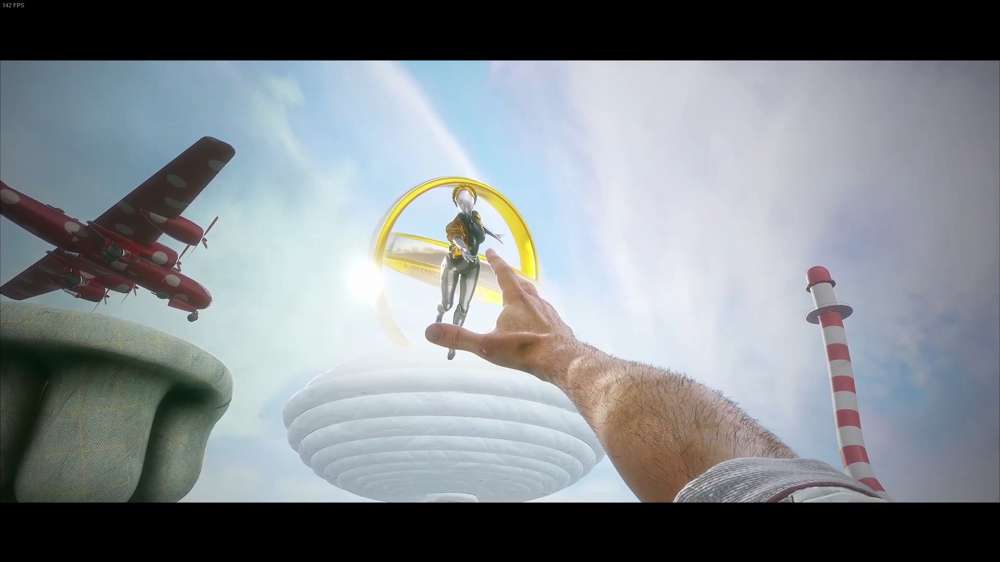Atomic Heart review: "Folds under its own lofty ambitions"
Check out our review of Atomic Heart, the debut FPS action RPG from developer Mundfish.

Upon hitting the credits on Atomic Heart and reflecting back on my experience with the game, I wondered how something that began so strongly could spin out of control and lose itself in such a spectacular way. From the opening moments, I was hooked by its Soviet retro-future aesthetics and arresting visuals, and for the next several hours I found myself having a blast with its BioShock-inspired combat and survival horror tone.
However, as time went on the cracks began to reveal themselves, and Mundfish's grab bag of assorted ideas folds under its own lofty ambitions to reveal an often derivative and messy experience that consistently flips between greatness and mediocrity.
For the motherland

Atomic Heart takes place in an alternative universe where the USSR became the dominant force of the world, ousting the Pax Americana with a series of incredible scientific achievements that saw it create flying cities, a robot labour force, and a worldwide network to connect them, all by the 1950s.
Your avatar for this unique world is P-3, a spec-ops soldier who's arrived in one of the aforementioned flying cities to receive a tune-up for his special glove and AI companion Charles. and to report to his mentor and boss, Sechenov. Fast-forward a bit, and you take a nice scenic trip back toward the Earth below to a special scientific research facility where things have gone awry in a robot/mutant outbreak that sees almost everyone murdered horribly.
It's a classic setup where the utopia isn't all it's made to be. Armed with just an axe, you're ordered to try and fix things before they spiral further and the wider world catches on to what's happening. These opening hours are perhaps the most consistently great stretch of Atomic Heart, as you're still figuring out this world and its quirks, and wondering what exactly caused everything to go wrong. But as the mystery opens up and the story becomes a lot more predictable, it loses steam massively.
There are a few reasons that Atomic Heart's narrative doesn't hit with the weight it should: it fails to capitalise on the themes and ideas it presents, instead becoming derivative of its biggest inspiration. It becomes confusing in its attempts to subvert expectations and shock the audience, and the protagonist is bewilderingly terrible, even lacking a character arc to help centre the narrative.
Free will is central to Atomic Heart's narrative, exploring the concept by contrasting humans and robots, and asking the player why they are doing this. There's never any satisfying resolution to this, though. There's no "a man chooses, a slave obeys"-type revelation to present a meaningful conclusion, and due to how often the story wants to try and subvert people's expectations of its direction, it loses the narrative focus that allows it to actually say anything worthwhile.
P-3 is also one of the worst protagonists I've had the displeasure to play as for a while, with awful dialogue and zero meaningful character development. Even during the best hours of Atomic Heart, he delivers snarky quips and juvenile jokes that are frequently unfunny and actively harm the atmosphere. However, the worst qualities are how aggressively naive and stupid he is. At several points in the story, your AI companion will explain that maybe your boss and the USSR have some sinister ulterior motives based on the information you learn, and he cannot wrap his head around it, denying it up until the final credits.
Crispy critters

What P-3 lacks in character and likeability, he makes up for in combat ability. Atomic Heart isn't a traditional FPS, and the way progression works is more akin to an action RPG as you slowly build up your prowess and combat effectiveness.
At the start of the game, Atomic Heart feels like a straight-up survival horror as each enemy presents a significant threat and tanks a lot of damage, and you're scouring for resources and supplies to make it through each room. You'll soon get access to more weapons and upgrades though, letting you even the playing field and hold your own against the robot masses and mutant hordes.
The combat itself has a lot of weight behind it, consistently making for one of the strongest parts of the game. With the way progression works, combat begins as a more deliberate affair, but as more deadly enemies are introduced and the game feels more comfortable locking you in a room with a dozen of them, it becomes more frantic and fast-paced.
It's also worth mentioning the excellent Mick Gordon soundtrack here, which elevates many of the boss fights and more carefully designed encounters to another level. Many of the songs combine elements of classical or Soviet-era tunes with modern metal, electronic, or even hip-hop music, making for a unique soundtrack that only immersed me further in the world that Atomic Heart built.
On top of your arsenal of various weapons, you can utilise a series of polymer-based abilities like a shock attack, freeze attack, and gravity manipulation. There's room here to specialise into your own fighting style, though it's quite limited by a lack of systemic interaction and environmental interaction that doesn't really let you combine them in any meaningful way.
Combat is at its best in the tight corridors of the underground facilities, and closed-in arenas where you're using all your tools to stay mobile and alive, but Mundfish had the puzzling idea to add an open-world map to facilitate travel between the major story points. The problem is, there's nothing to actually do here except get upgrades for weapons, and none of them are particularly necessary. You'll likely just gun it from one location to the other to continue the narrative, as the open world just feels like filler which drains your resources if you engage with it, and actively ruins the pacing.
Even the main story areas aren't free from harm. Each area feels like it goes on for just too long, actively turning the final third of the game into a slog that I elected to mostly run through. Even with the moments of greatness littered throughout the experience, Atomic Heart doesn't earn its runtime, and that's still when you don't engage with the little side content available.
Eurojank

Considering how gorgeous Atomic Heart is, I also expected it to have performance issues, and with some exceptions, the game largely ran great throughout. On my GTX 1070, with everything turned to mid or low, I rarely dipped below 60 FPS, staying around 100 FPS for most of the experience. The most egregious performance error was some crashes that happened in particularly busy points, but I can excuse three over the course of 20 hours.
That's not to say there aren't some obvious technical problems though. Dialogue lines would frequently clip, sometimes sounding like they were from completely different conversations, and the subtitles would often rush ahead of the actual dialogue being spoken (contributing to the hard-to-follow narrative). Objects would remain static in the air from looting nearly all the time, enemies would hit with melee attacks from way too far away, and in several cutscenes I ran into an issue where a character's face would stretch across the screen, revealing just their eyeballs and teeth floating in a black void.
An even bigger issue exclusive to PC players is the lack of an FOV slider. There's no excuse for this feature being missing in a big-budget FPS in 2023, and for many people like me who can get headaches and nausea from a narrow field of view, it was an outright detriment to my health and enjoyment. By default, it sits below 90, something most people would consider the very lowest acceptable FOV, and I had to actively back away from the desk just so I could keep playing at some points.
The verdict

I'd be hard-pressed to say Atomic Heart is an outright bad game, and despite featuring some awful elements, there's clear quality in its gameplay mechanics, art direction, and encounters that highlight Mundfish's talent. Stories from before release painted the development as largely directionless, causing them to have to fashion it into something playable and structured near the end, and this seems evident in the final product. Mundfish bit off more than it could chew, leading to a lot of half-baked ideas that should have been scrapped and reigned in. It makes the game's greatest moments ultimately bittersweet, as deep down there is potential for something excellent.
2.5/5
Reviewed on PC. Code provided by the publisher.
Comments

